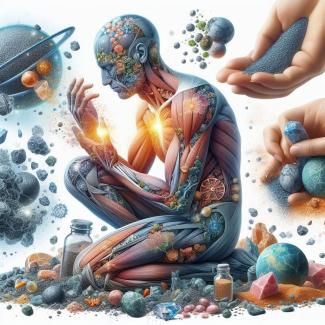
Iodine is an essential trace element that is crucial for the proper functioning of the human body. Its importance primarily lies in its role in thyroid function and overall health. Here are some key reasons why iodine is important for the human body:
- Thyroid Function: Iodine is a key component of thyroid hormones, thyroxine (T4) and triiodothyronine (T3). These hormones are critical for regulating the body's metabolism, controlling energy production, and influencing various physiological processes. Without sufficient iodine, the thyroid gland cannot produce enough of these hormones, which can lead to thyroid disorders, including hypothyroidism and goiter.
- Metabolism: Thyroid hormones, which rely on iodine, help regulate the body's metabolic rate. Adequate iodine levels support healthy metabolism, which in turn influences energy production, body temperature regulation, and the utilization of nutrients from food.
- Brain Development: Iodine is particularly important during pregnancy and early childhood. Thyroid hormones play a vital role in the development of the fetal brain and the central nervous system. An iodine deficiency during pregnancy can lead to cognitive and developmental issues in the child, a condition known as cretinism.
- Immune System: Iodine has also been shown to have antimicrobial properties, which can help the body fight off infections. In the past, iodine has been used as an antiseptic to disinfect wounds.
- Detoxification: Iodine is essential for detoxifying the body. It can help remove heavy metals and other toxic substances from the body.
- Hormonal Balance: Adequate iodine levels may help maintain hormonal balance in the body, including sex hormones.
Iodine is not produced by the human body, so it must be obtained through dietary sources. Common sources of dietary iodine include iodized salt, seafood, dairy products, and some vegetables (depending on the iodine content of the soil in which they are grown). In regions with insufficient iodine intake, iodine supplementation or iodized salt programs are often used to prevent iodine deficiency disorders. However, it's important not to consume excessive amounts of iodine, as excessive intake can also lead to thyroid problems. The recommended daily intake of iodine varies by age and life stage, and it's important to consult with a healthcare professional for guidance on iodine consumption.






